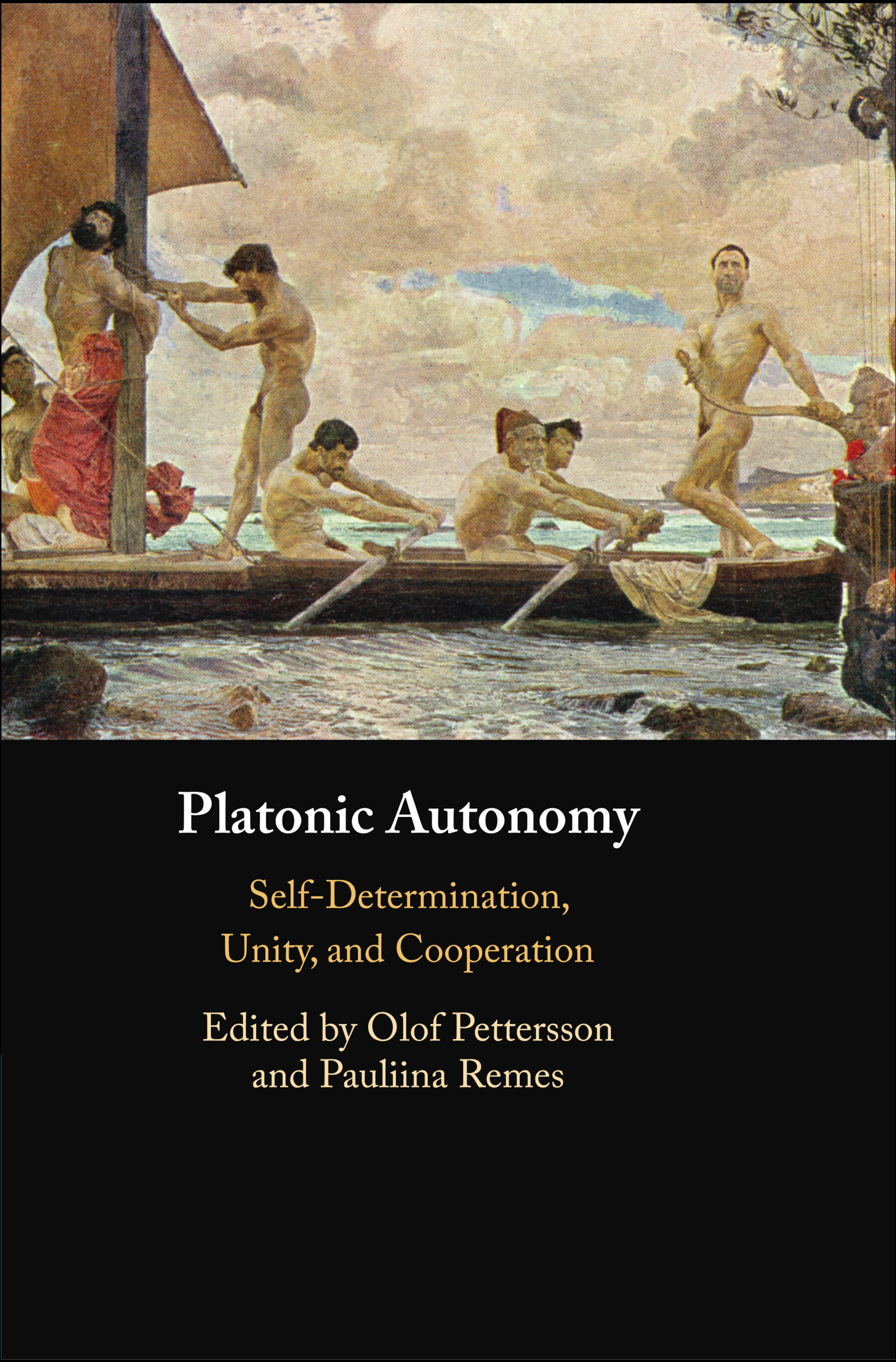Södertörn Center for Ancient Philosophy (SCAPh) brings together researchers and students from around to the world specializing in ancient Greek philosophy. Its purpose is to promote scholarship, foster collaboration, exchange ideas, and explore innovative applications of ancient wisdom to address contemporary challenges. The center organizes workshops, conferences, hosts guest lecturers and provides resources for researchers and students with the purpose of building a vibrant and relevant community. The center is housed at Södertörn University, in Stockholm, and its research is generously sponsored by the Axel and Margaret Ax:son Johnson Foundation for Public Benefit. Read more about the center and its vision here.

Plato and Political Dialectic
SCAPh’s inaugural research project is entitled ‘Plato and Political Dialectic’. This project will explore Plato’s political philosophy with a particular emphasis on the use and possibilities of the dialogue form. The project is not only designed to help deepen and advance our understanding of Plato’s political philosophy, but also to contribute to a broader conversation about the future of democracy, citizenship, and the role of reason in public life.
- Research Seminar: Aristotle’s De Anima, Poetics, and RhetoricAt this semester’s Advanced Seminar in Ancient Philosophy, led by Charlotta Weigelt, we will continue with Aristotle. The schedule for the fall is as follows. Anyone is welcome to join. 19/9 10-12: De Anima III.7-13 17/10 13-15: Poetics I-XXVIII 14/11 10-12: Poetics XXIX-XLVII 19/12 10-12: Rhetoric, Book I We meet in room PC249 on campus. If you cannot attend in person, it is also possible to join via Zoom. If you are interested in this possibility, please write to charlotta.weigelt@sh.se and she will send you an invite link.
- Plato & LawsOn October 16th 2025, SCAPh will organize an international workshop on “PLATO & LAWS”. The event is organized to explore Plato’s conceptualization of law, both as the chosen title of his last work, the Laws, in all of its complexity and richness, and as a distinct concept, developed throughout the dialogues. The event will be framed around the presentation of papers by three international guests, Nicholas D. Smith, Ikko Tanaka and Irina Deretić, and by two Swedish researchers, Hans Ruin and Charlotta Weigelt. For a detailed program, see below. The event is free and open to all, but please send a brief email to info@scaph.se if you intend to come, as seating is limited. Program (16th of October 2025) 1000-1100 Irina Deretić & Nicholas D. Smith: “How to Reason with a Distraught Friend: Socrates, Crito, and the Personified Laws”. 1100-1200 Hans Ruin: “Sacrifice and the Constitution of Community in the Laws” 1200-1300 Lunch 1300-1400 Ikko Tanaka: “Laws as Soul’s Activity in Plato’s Laws” 1400-1500 Charlotta Weigelt: “The Rule of Law as a Democratic Predicament” 1500-1600 Reception and Book Release for Platonic Autonomy: Self-Determination, Unity, and Cooperation (CUP 2025) edited by Olof Pettersson and Pauliina Remes Venue: Room F11, Södertörn University. Nicholas D. Smith is James F. Miller Professor of Humanities and Professor of Philosophy at Lewis & Clark College. He has written and edited many books on ancient Greek philosophy and contemporary epistemology, including Plato’s Socrates (with T.C. Brickhouse, OUP 1994), Socratic Moral Psychology (with T. C. Brickhouse, CUP 2010) and Socrates on Self-Improvement (CUP 2023). Ikko Tanaka is an associate professor in the College of Arts and Sciences at J. F. Oberlin University in Machida, Japan. He earned his Ph.D. from Kyoto University in March 2014. His academic publications encompass ancient philosophy, digital humanities, and higher education studies. Irina Deretić is professor of philosophy at the Department of Philosophy at the University of Belgrade, Serbia, where she also serves as head of the project “The History of Serbian Philosophy”. Deretić’s research focuses on ancient Greek philosophy, particularly Plato’s metaphysics, philosophy of language, and ethics. Hans Ruin is Professor of Philosophy at Södertörn University. He is the translator of the fragments of Heraclitus to Swedish and his most recent book, Being with the Dead: Burial, Ancestral Politics, and the Roots of Historical Consciousness (Stanford UP, 2018), won the ICHTH & INTH Bookprize in 2022. Charlotta Weigelt is Professor of Philosophy at Södertörn University. She is the translator of Aristotle’s Physics and the Nicomachean Ethics into Swedish, with an ongoing translation of the Metaphysics. She is the author of numerous articles and books on Plato and ancient Greek philosophy, including Socrates: The Philosopher’s Many Faces (Faethon 2023). For more information or if you have any questions, please send an email to olof.pettersson@filosofi.uu.se
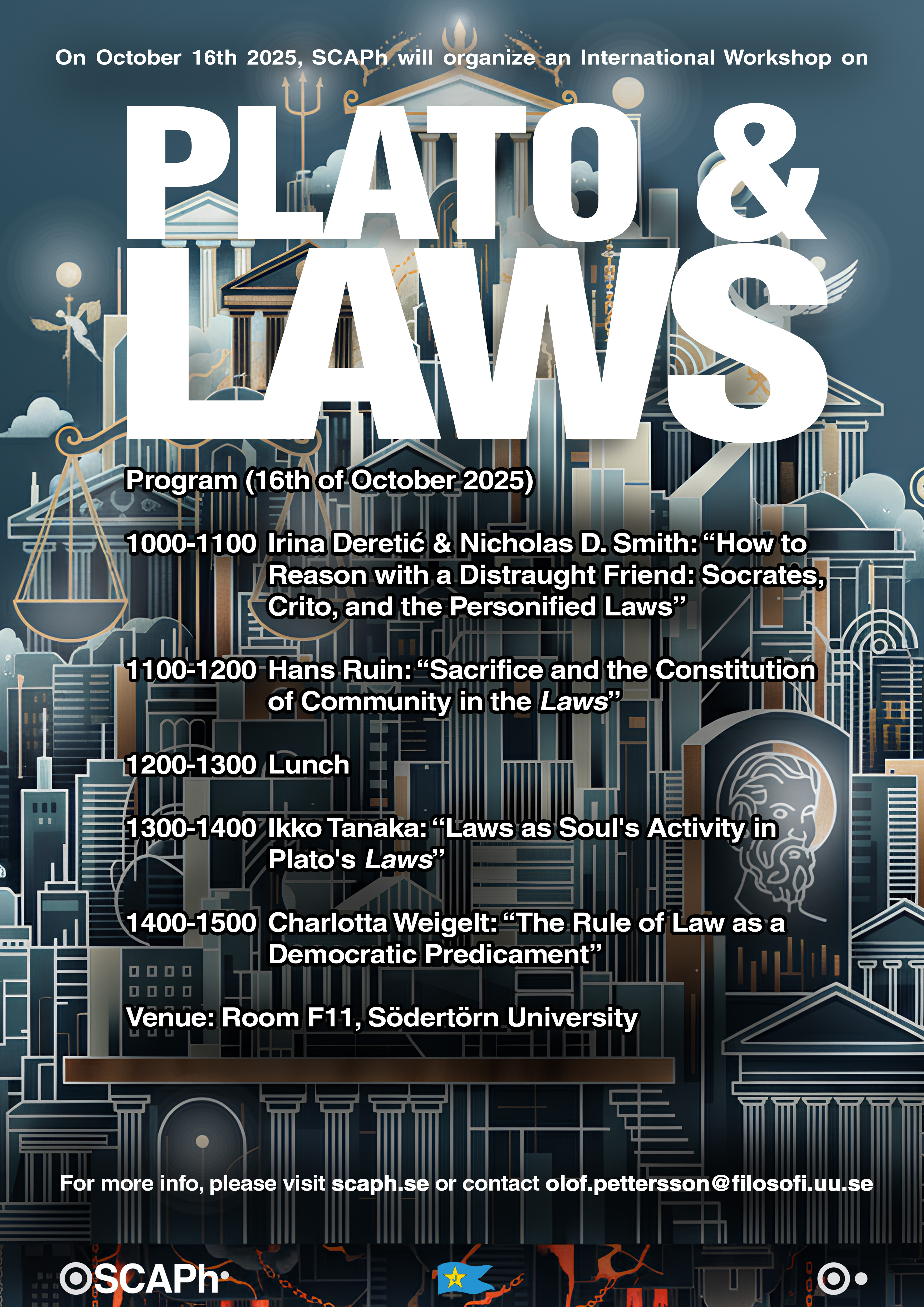
- (no title)NEWS
- Platonic Autonomy (CUP)Fresh from the press: Platonic Autonomy: Self-Determination, Unity, and Cooperation, edited by Olof Pettersson (together with Pauliina Remes) was just published by Cambridge University Press. The volume highlights Plato’s relevance for the notion of personal autonomy, offers discussions of self-legislation, self-determination, self-rule, law, preference, and freedom from a wide range of perspectives, and includes an important chapter on “Self-Government and Law in the Crito and the Statesman” by Charlotta Weigelt. Together the essays of the volume show how deeply these concepts are intertwined with Plato’s more familiar inquiries into knowledge, moral psychology, ethics, politics, and metaphysics. The book also reveals how some of the Platonic worries about self- and other-determination become interpreted and given explicit expression by the Neoplatonists. Many chapters question an exclusively individualistic account of autonomy. The autonomous subject, for Plato, is not primarily the possessor of individual preferences, nor someone with a personally unique take on the world, but, rather, a unified agent who in both collaborative and personal activities originates her own motions and reasons and commits in a profound sense to her own actions. It is this understanding of personal autonomy we label Platonic. Read more here.
- Interview in Swedish PhilosophyThe Swedish e-journal Swedish Philosophy (Svensk filosofi) has spoken with Charlotta Weigelt and Hans Ruin about what makes ancient philosophy relevant today. Here is a brief (translated) exerpt: Antiquity was a world distinct from our own. Ancient Athens was a city-state with a citizenry so small that its politically active members could recognize one another. Rome, in contrast, was a hierarchical global empire defined by a culture of honor. Both were patriarchal, slave-holding societies. How, then, can ideas that emerged in that world inform us in our modern one? – I’m thinking primarily of Plato, who seems to write with the awareness that he’s facing a new kind of society, says Charlotta Weigelt. The older warrior society is in the back of his mind. The questions Plato sees as necessary to ask are fully applicable to our society today because they are so fundamental. – Ultimately, these are questions about how we can live together. How can we do that when we are facing a society that is much more heterogeneous than the one we are leaving behind? What is governance? What does it mean to be governed? What different types of governance exist? What is a citizen? Read the full interview here.

- Weigelt Talks about Socrates in the Philosophy Podd with Mogensen & TsaposThe philosophy podd (filosofiska podden), with Melina Tsapos and Lars Mogensen, has visited the Geijer Society’s summer course in philosophy at the Ransäter folk high school. There, they met Charlotta Weigelt, professor of philosophy at Södertörn University who specializes in ancient philosophy, and discussed how Socrates’ way of thinking and seeing the world can help us today? Listen to it here (spotify) or here (apple).
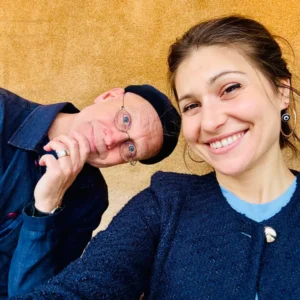
- Ruin and Weigelt visits Bildningspodden to talk about StoicismFor a long time, the teachings of the ancient Stoics were regarded as detached from the world and apathetic. Today, Stoicism has become a trendy philosophy—an ancient self-help guide to mindfulness for those who want to endure a chaotic and incomprehensible modern world. In the process, thinkers like Marcus Aurelius and Seneca have become bestsellers. But how well does the hype align with what the Stoics actually wrote and thought? Is the famous “stoic calm” about being indifferent or maturely composed? Did the Stoics primarily aim to make life bearable for the individual, or did they also seek to make the world a better place? And what makes these ancient ideas so relevant today? *Bildningspodden* delves into the sources of Stoicism together with philosophers Charlotta Weigelt and Hans Ruin. Listen here (in Swedish).
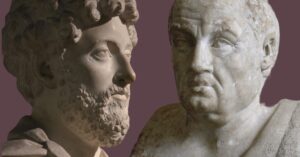
- Swedish Philosophy & Ancient Philosophy TodaySvensk filosofi (Swedish Philosophy) is a new journal (ISSN 3035-6598) aimed at promoting the role and presence of philosophy in society. The journal has recently launched a series of articles under the label of Ancient Philosophy Today, featuring contributions by Hans Ruin and Charlotta Weigelt. You can read the texts here. The journal describes the series in the following way: “Almost all programs in the humanities and social sciences require studies in ancient philosophy. But are Socrates, Plato, and Aristotle really relevant today? In what way? What can we learn from ancient thought – and do we truly know what the thinkers of antiquity actually thought?”
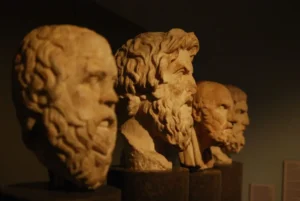
- (no title)PASSED EVENTS
- Research Seminar: De AnimaThis semester’s Advanced Seminar in Ancient Philosophy, led by Charlotta Weigelt, will focus on Aristotle’s De Anima. Anyone is welcome to join. The schedule for the fall is as follows. 31/1, 10-12: Book I, ch. 1-5 7/3, 10-12: Book II, ch. 1-6 11/4, 13-15: Book II, ch. 7-12 9/5, 10-12: Book III, ch. 1-7 4/6, 10-12: Book III, ch. 8-13 We meet in room PC249 on campus. If you cannot attend in person, it is also possible to join via Zoom. If you are interested in this possibility, please write to charlotta.weigelt@sh.se and she will send you an invite link.

